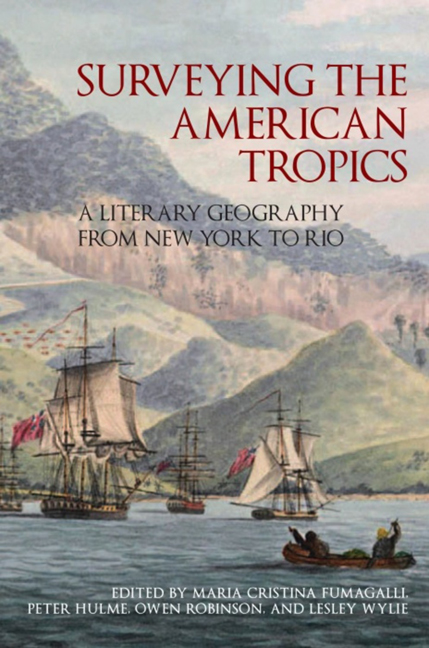Book contents
- Frontmatter
- Dedication
- Contents
- List of illustration
- Introduction
- A Tree Grows in Bajan Brooklyn: Writing Caribbean New York
- Reading the Novum World: The Literary Geography of Science Fiction in Junot Díaz's The Brief Wondrous Life of Oscar Wao
- Inventing Tropicality: Writing Fever, Writing Trauma in Leslie Marmon Silko's Almanac of the Dead and Gardens in the Dunes
- Imperial Archaeology: The American Isthmus as Contested Scientific Contact Zone
- Space Age Tropics
- Black Jacobins and New World Mediterraneans
- The Oloffson
- Dark Thresholds in Trinidad: Regarding the Colonial House
- Micronations of the Caribbean
- Golden Kings, Cocaine Lords, and the Madness of El Dorado: Guayana as Native and Colonial Imaginary
- Suriname Literary Geography: The Changing Same
- The Art of Observation: Race and Landscape in A Journey in Brazil
- Notes on Contributors and Editors
- Index
The Oloffson
- Frontmatter
- Dedication
- Contents
- List of illustration
- Introduction
- A Tree Grows in Bajan Brooklyn: Writing Caribbean New York
- Reading the Novum World: The Literary Geography of Science Fiction in Junot Díaz's The Brief Wondrous Life of Oscar Wao
- Inventing Tropicality: Writing Fever, Writing Trauma in Leslie Marmon Silko's Almanac of the Dead and Gardens in the Dunes
- Imperial Archaeology: The American Isthmus as Contested Scientific Contact Zone
- Space Age Tropics
- Black Jacobins and New World Mediterraneans
- The Oloffson
- Dark Thresholds in Trinidad: Regarding the Colonial House
- Micronations of the Caribbean
- Golden Kings, Cocaine Lords, and the Madness of El Dorado: Guayana as Native and Colonial Imaginary
- Suriname Literary Geography: The Changing Same
- The Art of Observation: Race and Landscape in A Journey in Brazil
- Notes on Contributors and Editors
- Index
Summary
It is hard to ignore the hotels’, Ian Strachan begins his Paradise and Plantation: ‘They rise like mammoths of iron and concrete above the homes, the office buildings, the trees of New Providence, island of my birth’. He goes on to argue that Caribbean hotels are modern plantations— locally-run but foreign-owned businesses that create a product for customers overseas, but instead of sugar or tobacco what they offer is a holiday experience in ‘paradise’.
The subject of this essay is a rather different hotel. A slightly run-down gingerbread mansion today more likely to find journalists, aid workers, military personnel, documentary film-makers, art collectors, and up-market literary travellers as guests rather than tourists in search of golden beaches. Visitors to the Hotel Oloffson in Port-au-Prince, Haiti, describe it in terms that sharply distinguish it from the towering chain hotels that line seafronts elsewhere in the Caribbean: ‘a folly of spires and conical towers’ with ‘decorative wrought iron and wide verandas’ and ‘shadowy bohemian interiors’. They invariably refer to its idiosyncratic owner, Richard A. Morse, a Haitian-American with a degree in anthropology from Princeton, founder and lead singer of RAM, commonly described as a ‘vodou rock and roots’ band, whose political edge has sometimes landed him in trouble with the authorities. They will also remind you that the building was made famous when it served as the model for the Hotel Trianon in Graham Greene's 1966 novel The Comedians.
The essay draws on several travel writers’ accounts of the Hotel Oloffson from the last twenty years or so—in other words, the period following the fall of the Duvalier dictatorship, which more or less coincides with the period Morse has run the hotel. I will identify some of the ways in which these writer-guests imaginatively inhabit the various private and public spaces of this particular hotel and its surroundings. And although the Oloffson appears to be an unusual case, I will suggest that there are continuities between it and the ‘plantation hotels’ invoked by Strachan significant enough to excuse some tentative hypotheses concerning the role of the tropical hotel, the politics of location, and contemporary travel writing.
- Type
- Chapter
- Information
- Surveying the American TropicsA Literary Geography from New York to Rio, pp. 183 - 201Publisher: Liverpool University PressPrint publication year: 2013



